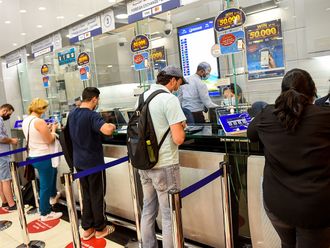
Dubai: The Saudi non-oil private sector economy is marching into higher growth during March, signalling more rapid job creation - now at its fastest rate in 5 years - and spending by businesses. There was one catch though – Saudi firms are ‘struggling’ to pass on their higher costs onto their clients, according to the latest PMI (Purchasing Managers Index) data from Riyad Bank.
In fact, selling prices rose only ‘marginally’ in March, which is attributed to the heavy competition as well as pushback from consumers.
So much so, businesses optimism about the immediate future is running at a 3-year high.
The big positive is on job creation – “Staffing levels have risen across all sectors and the growth in employment was among the strongest seen in the past five years,” said Naif Al-Ghaith, Chief Economist at Riyad Bank. “Business conditions remain strongly positive at the end of the first quarter of 2023 as improving market conditions and increased development spending helped to boost demand in the non-oil private sector. Both output and new orders have expanded sharply, adding pressure on capacity at non-oil companies.”
The March PMI reading for the Saudi economy – which will be bolstered by likely higher oil prices from the latest 500,000 barrels a day cut from May – comes to 58.7, down slightly on the 59.8 in February, which was the highest in nearly 8 years.
"Despite the global headwinds including the recent credit crunch and heightened uncertainty, Saudi non-oil firms exhibited a robust degree of confidence towards future activity in March,” said Al-Ghaith. “Supportive government policies along with improving demand levels have been grounds for this optimism."
Bullish over short-term prospects
Saudi non-oil businesses remain confident of more rises in activity over the next 12 months. The degree of optimism is unchanged from February and 'stronger than the trend seen over the past three years'.
"Strong confidence levels and a desire to boost capacity led companies to increase their headcounts in March," the PMI report adds. "Despite easing slightly from February, the rise in employment was among the quickest seen in the past five years."
"On the latter, efforts to compensate workers facing higher living costs meant that salaries rose to the
greatest degree since September 2016," according to the PMI report.
Export wins
March numbers show more sustained pickup in exports. This, according to Al-Ghaith, can be due to two reasons. "First, the improvement in industrial landscape has created positive grounds for producers to diversify their production lines and compete in foreign markets, enlarging their market share," he added. "Secondly, the recent depreciation of the US dollar made those goods more affordable and accessible to a number of inflation-torn economies."












